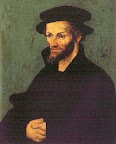This may get a little deep and if so I apologize now but this is pretty significant to Luthers break with the church. So here goes... In 1507 Luther was ordained as a priest and went back to the University of Erfurt to continue his studies in Theology. While there he was exposed to the humanist ideas and embraced their slogan "Ad Fontes" or "Back to the Source." Humanists believed that the Greek and Latin classics contained both all the lessons one needed to lead a moral and effective life and the best models for a powerful Latin style. The humanists developed a rigorous and new kind of study program that helped correct and better understand the ancient works of the Greeks and the Romans. The humanist were skilled teachers and taught many to read and write in the classical styles of the ancients. The humanist also convinced many of the popes that they were a needed commodity within the papal circle to write Letters, propaganda, and to write a classical form of the Mass. In the late fifteenth and early sixteenth centuries, humanist theologians insisted that the formal theology of the universities was far less valuable than a direct knowledge of the biblical text, and that the documents that supported the church's privileges should be subjected to critical scrutiny, like any others. Now Martin Luther felt very strongly about this idea and used the humanist style to create for himself a formal Bible study which meant that he would study the bible in it's Hebrew and Greek texts. The humanist movement provoked the Church to reject their ideals because it went against the rigidness of the educational and scholastic programs of the Church.
Erasmus
Among the prominent artists and scholars aligned with the humanist movement was Erasmus von Rotterdamm. Erasmus was known all over Europe and was considered to be a great intellectual of the time. Erasmus initially liked the reforms that Martin Luther was putting in place as he was learned in the Greek and Latin texts and was critical of the papacy. The kinship did not last long, however some of Luther's closest associates kept in contact with Erasmus through the years. Among them Phillipp Melanchthon.
Luther himself stated that he came to this decisive realization in the study room of the Wittenberg monastery. When this actually happened is disputed; it is also known as the Tower experience. In 1514, while lecturing on Psalm 71, he discovered his principal of "justification by faith." This new key to the entire Bible became the centerpiece of his new theology. Luther's theology developed quickly, and soon the entire faculty of the university accepted his ideas. By 1517 Wittenberg had become a center of Biblical humanism. Around this same time Luther called for Phillip Melanchthon to come teach at Wittenberg. In addition, Martin Luther was also the priest of the City Church of Wittenberg.
WOW! I told you this would be deep! Next up...what I am sure everyone has been waiting for 95 Theses.Reference Links (Because there is no way I am this smart!):
http://www.pitts.emory.edu/ARCHIVES/text/mss090.html
http://www.ibiblio.org/expo/vatican.exhibit/exhibit/c-humanism/Humanism.html









No comments:
Post a Comment